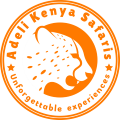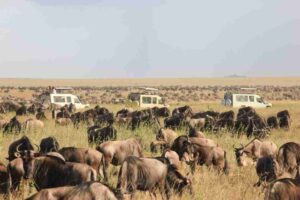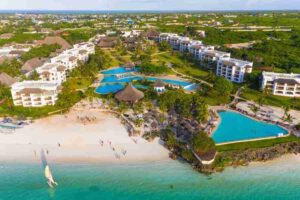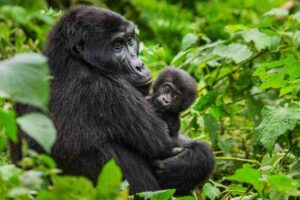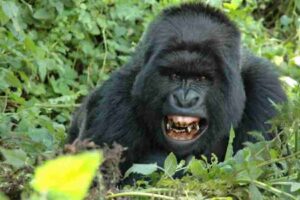| Name of the facility | Mara Serena Safari Lodge |
|---|---|
| Certification Achieved | Silver |
| Year opened | 1973 |
| Tourism region | Masai Mara/South Rift |
| County | Narok |
| Address | 48690 ( 00100) Nairobi Map It |
| Telephone/Mobile | +254736595900 |
| mara@serena.co.ke | |
| Website | serenahotels.com |
| Facility Notes | Mara Serena safari Lodge is located in the Mara Triangle of Masai Mara National Reserve. The lodge is specifically located on Global Positioning System (GPS) Coordinates, Latitude: 1.24’09S and Longitude: 35.01’34E. The Lodge was opened in 1973 and has 74 guest rooms with a bed capacity of 140 visitors and a total workforce of 130 employees. The facility is built on 11.6115 acres (4.699ha) of land in the Mara triangle of Masai Mara National Reserve. The Mara Triangle forms a core part of the larger Maasai Mara ecosystem. The ecosystem is dominated by Themeda triandra grassland interspaced by pockets of riverine forest and acacia woodlands. There are about 95 species of mammals and 570 species of birds. Numerous other antelopes can be found, including Thomson’s and Grant’s gazelles, impalas, elands, duikers and Coke’s hartebeest. The Mara is home to the “Big Five” (lion, leopard, African elephant, African buffalo, and Black Rhinoceros). Large herds of zebra are found through the conservancy. The plains are also home to the distinctive Masai giraffe. The large Roan antelope and the nocturnal bat-eared fox, rarely present elsewhere in Kenya, can be seen within the reserve borders. The climate of the region is mainly warm and dry; with hot days and cool evenings. The rainy season is in April-May and November. The dry season occurs from July to October |
| Energy management | The lodge depends on two main sources of power, solar energy and diesel generators. There are three (3) generators with power output of 275 KvA. Solar energy is used for water heating at the drivers’ quarters whereas the generators are used for guest water heating, lighting and running refrigerators. The generator power is connected to power inverters and rationed to enhance energy conservation. Energy consumption is metered and monitored through recording on a daily basis. Results are used to establish ‘Monthly utility reports’ discussed at management levels in order to lower consumption. Energy saving bulbs and light emitting diodes are installed throughout the facility for energy conservation. Liquefied petroleum gas (LPG) is used for cooking. The lodge has a policy where the guests are briefed and encouraged on energy conservation. |
| Environmental management | The lodge is guided by a clear corporate environmental statement that is committed to protecting the environment, monitoring the interests of the local population, practicing a responsible attitude towards resource use and conservation of protected areas. Mara Serena Lodge has an Environmental Management System (EMS) with management plans for water, energy and waste. The lodge has undertaken its annual self-Environmental Audit (EA) as required by EMCA 1999 (Environmental Management and Co-ordination Act). |
| Chemical use | The lodge uses biodegradable bathroom amenities such bathing soaps and shampoos supplied by Eco-Boutique limited. Diversy chemicals and Ecolab are used for washing in the laundry section. Swimming pool chemicals are supplied by Arch chemicals. (Recording is done to monitor chlorine consumption and use of algaecide). Material Safety Data Sheet (MSDS) for the chemicals are available. Fuel (Diesel) is stored in an underground tank of 15,000litres fixed with a fuelling pump. Gas is bought in bulk (2 tonne tanks) and its consumption is monitored. The cylinder pressure gauge and PSI has been checked and serviced for safety purposes. The storage area is fenced and fixed with precautionary signage. |
| Conservation Criteria | |
| Community Criteria | |
| Solid waste management | Waste separation is done at source, the bins are clearly labelled. Further sorting is also done at the waste management centre before disposal via Nairobi central stores to recycling companies. Organic waste is composted in a well-sealed compost pit. The Lodge uses solar rechargeable torch batteries as a move to reduce batteries waste. Water for staff is served in 18litre water dispensers aimed at plastic waste reduction. Medical waste such as Sharps is taken to Kilgoris District Hospital for incineration. |
| Water management | Water for the lodge is pumped from a borehole and stored in tanks with an average capacity of 135,000 litres. It is treated through sedimentation, filtration and chlorination before supply to all consumer points. The water is metered and consumption monitored at the main outlet. The facility has a rapid maintenance team to attend to any water leakage. The lodge has a water permit for the borehole water extraction. The facility has “towel talks” in the guest rooms encouraging visitors on the re-use of towels, to promote water conservation. Visual signage is fixed in areas such as kitchen, used to sensitize staff on water conservation. The guest room toilets have dual water cistern system to conserve on water consumed per flush. Low shower faucets are fixed in the lodge for water use efficiency. Laundry machines are operated at their optimum weight to conserve on water and energy. |
| Visitor communication & education | Guests are briefed upon arrival on the environmental values and operations of the lodge. On a daily basis, guests are taken through evening slide shows aimed at creating awareness. The slide shows cover conservation initiatives within Mara conservancy. |
| Pollution | The generator is insulated and fixed with a muffler – sound reducing device. An oil interceptor has been installed at the generator section to contain spillage. The lodge paths lights are fixed with a cover reduce on light pollution. The kitchen is properly ventilated, fixed with a kitchen hub. This is aimed at enhancing the working conditions of the staff. |
| Environmental conservation | Mara Serena blends with the natural surroundings. Its architectural design resembles the Masai Manyatta. The guest rooms are endowed with Masai décor (the décor is bought from the locals). The rooms are also designed to make maximum use of natural lighting during the day. The Lodge distributes tree seedlings – indigenous – and conducts tree planting with local schools; these include Emurototo and Esokon primary schools. The seedlings are obtained from the facility tree nursery which has approximately 5000 seedlings which are sourced from Gilgil. The lodge partners with Mara conservancy rangers on emergency responses, and conservancy (wildlife) security. The facility driver guides uphold the conservancy code of conduct. Mara Serena is a partner in the Mara Predator Project – an initiative to build an identification database of lions and cheetahs in and around the conservancies north of the Masai Mara National Reserve through tracking individuals, effective conservation techniques. The initiative is implemented through involvement of the facility guides and visitors in identification of the lions and cheetahs. In addition, wildlife researchers are given opportunities occasionally to give talks to guests on their research undertakings. The lodge has a naturalist who conducts nature walks, environmental lectures and slide shows daily for guests, in an effort to raise awareness. Conservancy rangers and management are housed at Serena Mara Lodge which provides their energy and water needs, and occasionally receive logistical support. |
| Waste water management | Effluent from the kitchen flows through a grease trap before joining the sewer system. The grease trap is cleaned daily. Grey effluent from the laundry, guest tents and staff quarters flows into septic tanks for solid waste sedimentation. EM1 bio-enzymes are added to enhance sludge digestion. The effluent later flows into soak pits via radial arms. NEMA sampling points are indicated within the system. Water effluent tests are conducted regularly and the facility issued with an effluent discharge license by NEMA. Swimming pool water is cleaned via vacuum cleaning and backwash systems. PH levels are checked twice a day. Effluent from backwash is managed through a soak away.Black effluent within the facility is managed through systems that comprises of sewer line, man holes, and septic tanks and soak pits. The effluent drains in a septic tank for sludge sedimentation facilitated by bio-enzymes. |
| Purchasing and supplies | The lodge purchases its vegetables and fruits packed in crates. Dry goods are bought in bulk to reduce on packaging. Meat is packed in re-usable cold boxes. |
| Employment and remuneration/staff welfare | Employees have a staff welfare committee which meets on monthly basis. It is ascribed to the workers union and, handles and addresses staff issues. |
| Staff education, communication and awareness training | There are notice boards for staff communication within the facility. Emails and memos are also used to facilitate communication. The staff is sensitized and briefed during departmental meetings. Various (visual) sensitization signs are used enhance communication |
| Cultural preservation and promotion/protection of local sites | Serena Mara facilitates guests’ village visits at a fee of 70 USD per visitor of which 20 USD goes to the community. The fee is paid directly at the lodge and duplicate voucher issued, one copy is filed and the other issued at the village. The fee is paid to the locals on monthly basis. Visitors experience includes purchase of local curios, cultural talks and entertainment dances. The lodge conducts Maasai Cultural talks to the visitors on every Saturday of the week. |
| Benefits to local community/community empowerment | The lodge purchases from the local community where feasible, this include goat meat for staff use. Vegetables and fruits are purchased from a local supplier at least once a week. Mara Serena launched a community library in November 2015 and supplied story books to be used by children from the local Isokon village- through an initiative by Serena Hotels dubbed “Reading for Children”. The facility supplies newspapers to the library as well. Through partnerships with willing guests, Serena Hotel chain has also embarked on a solar lamp project beginning with Serena Mara. Solar lamps are provided to primary school going children (standard 7&8) to use for their study needs at home. The project is being rolled out to other areas where the hotel chain operates. Other achievements through partnership with willing donors include; Support to Esokon Primary School through donations such clothes, food and, learning materials including books and pens and providing mobile health services to the locals. Approximately 60% of the employees are hired from Narok County and staff welfare benefits include food, uniform, entertainment centre, transport and accommodation. |
| Cultural Criteria | |
| Health and safety | The lodge has a health and safety committee to spearhead health and safety issues within the facility. Additionally, there is a fire team trained on firefighting and first aiders in the distributed in all departments. A total of 51 employees are trained on first aid and fire-fighting skills. In addition, a health and safety audit has been carried out. The Lodge has a clinic within the premises and a 24 hrs clinical officer on duty to attend to the staff and guests. The clinic is well equipped with medical equipment including, emergency nebulizers, defibrillators, and artificial oxygen. First aid kits are also available in the main departments such as the kitchen. The lodge has an established evacuation plan, and the guest rooms are fixed with telephones for emergency response. Charter air services can be provided for emergency response. Medical examination is conducted to all food handlers within the facility in every six (6) months. Inspection has been conducted by public health inspectors under the Ministry of Public Health and Sanitation and the lodge issued with a Health Inspection License Firefighting equipment including, fire extinguishers, fire blankets, are duly serviced and strategically placed within the facility. Sand buckets are also used to complement the fire extinguishers. The lodge provides PPE (Personal Protective Equipment) including boots, overall, gloves to the staff. Fire exits, fire panic alarms and assembly points are properly marked and displayed within the facility. The guest rooms are fixed with a fire evacuation procedure and facility map to the nearest fire assembly points. Precautionary and safety signage are well fixed in areas such as the gas storage, the swimming pool and fuel pumping station. Proper housekeeping (clean, tidy and orderly arranged) was noted in the food and dry goods store. |
| Child labor, abuse and human rights | the facility has a Human Resource policy that guides against employment of minors. Minimum employment age is years. |
| Business Practises Criteria | |
| Entry Date | 9th March 2018 |
Mara Serena Safari Lodge
Safe, Sustainable, Affordable & Unforgettable Africa safari experiences that Educate, Connect, Transform and Inspire.
Your dream safari in Kenya & East Africa is just a call or email away. Contact Adeli Kenya Safaris today. Tel: +254720564538 | WhatsApp: +254720564538 | Email: info@adelikenyasafaris.com
Share this:
Why Go with Adeli Kenya Safaris
- Born, raised & based in Africa. Let u show you the Africa we know well and cherish so much
- Africa sustainable travel is our passion
- Great Value for Money. Best price guaranteed
- Experienced team of travel experts
- Knowledgeable & multi-lingual safari guides
- Safety conscious
- Fleet of well maintained vehicles
Your dream safari / holiday is just a call or email away. Contact Adeli Kenya Safaris today. Tel: +254720564538 | WhatsApp: +254720564538 | Email: info@adelikenyasafaris.com
EXPLORE OUR FEATURED EAST AFRICA SAFARI HOLIDAY DESTINATIONS
FEATURED TOURS & HOLIDAY PACKAGES BY COUNTRY
Go Wander the wonderful world with Adeli Kenya Safaris

Africa Safari Tour Packages
Africa is more than just a destination—it is a feeling, an awakening, and a journey that touches the soul in ways words can hardly capture. Africa is a continent that stirs the soul, awakens curiosity, and leaves every traveler forever changed.
Europe Holiday Packages
SouthEast Asia Holiday Packages
Middle East Holiday Packages
Indian Subcontinent Holiday Packages
Central Asia Holiday Packages
Far East Holiday Packages
Australasia Holiday Packages
North America Holiday Packages
Central America Holiday Packages
South America Holiday Packages
Cruise Holiday Packages
Adeli Kenya Safaris, Kenya safari, African safari Kenya, Wildlife safari Kenya, Kenya wildlife tours, Kenya game drives, Safari holidays Kenya, Kenya safari tours 2025, Best Kenya safaris, Luxury Kenya safaris, Affordable Kenya safaris, Masai Mara safari, Amboseli safari, Tsavo National Park safari, Lake Nakuru safari, Walking safari Kenya, Hot air balloon safari Masai Mara, Birdwatching safari Kenya, Family safari Kenya, Photography safari Kenya, Cultural safari Kenya, Beach and safari Kenya, Private safari Kenya, Fly-in safari Kenya, Camping safari Kenya, Luxury tented camps Kenya, Best time to see the Great Migration in Masai Mara, Affordable family safari packages in Kenya, Luxury safari lodges in Kenya with private game drives, Walking safaris in Laikipia conservancy, Hot air balloon safari over Masai Mara at sunrise, Best birdwatching spots in Kenya during November, Family-friendly safari resorts near Nairobi, Photography tours in Amboseli with Kilimanjaro views, Cultural experiences with the Maasai tribe in Kenya, All-inclusive beach and safari packages in Kenya coast, Private guided safaris in the Chyulu Hills, Fly-in safari to remote areas of northern Kenya, Budget camping safaris in Tsavo East National Park, Luxury tented camps in the Mara Triangle for honeymooners, Best wildlife viewing in Kenya during the dry season (July-October), Ethical wildlife safaris in Kenya supporting conservation, Small group safari tours in Kenya for solo travelers, Wheelchair accessible safari options in Kenya, Kenya safari itineraries for first-time visitors, Best Kenya safari for seeing rhinos, Tanzania safari, African safari Tanzania, Wildlife safari Tanzania, Tanzania wildlife tours, Tanzania game drives, Safari holidays Tanzania, Tanzania safari tours 2025, Best Tanzania safaris, Luxury Tanzania safaris, Affordable Tanzania safaris, Serengeti safari, Ngorongoro Crater safari, Zanzibar safari, Tarangire safari, Lake Manyara safari, Ruaha National Park safari, Nyerere National Park (Selous) safari, Kilimanjaro safari (often combined with wildlife), Mahale Mountains chimpanzee trekking, Gombe Stream chimpanzee trekking, Best time to see the Great Migration in Serengeti, Luxury lodges in Ngorongoro Crater with wildlife viewing, Family safari packages in Tanzania with beach extension, Walking safaris in northern Tanzania, Hot air balloon rides over the Serengeti plains, Birdwatching tours in Lake Manyara National Park, Cultural tours in Tanzania combined with safari, Affordable camping safaris in Tanzania’s southern circuit, Photography workshops on Tanzania safaris, Honeymoon safari packages in Serengeti and Zanzibar, Wildlife safaris near Arusha for short trips, Chimpanzee trekking tours in western Tanzania, Best Tanzania safari for seeing the Big Five, Small group safari tours in Tanzania for solo travelers, Tanzania safari itineraries including Kilimanjaro trek, Ethical and sustainable safari options in Tanzania, Fly-in safaris to remote parks in Tanzania, Best time for wildlife photography in Tanzania, Tanzania safari deals and discounts, Serengeti Great Migration river crossing tours, best tour company in Kenya, best safari company in Kenya, best tour operator in Kenya, best travel company in kenya, best travel agency in kenya, best kenya safari company, nairobi safaris, nairobi kenya safaris, kenya safaris, safari in kenya, kenya wildlife safaris, kenya safari tour, kenya tours, Best responsible tours and travel agency in kenya, Best responsible tours and travel company in Tanzania, Best responsible tours and travel company in Zanzibar, Best responsible tours and travel company in Uganda, Best responsible tours and travel company in Rwanda, Best responsible tours and travel company in Botswana, Best responsible tours and travel company in Namibia, Best responsible tours and travel company in South Africa, Best responsible tours and travel company in Mauritius, Best responsible tours and travel company in Seychelles, Best responsible tours and travel company in Madagascar, Best responsible tours and travel company in Mozambique, Best responsible tours and travel company in Egypt, Best responsible tours and travel company in Israel, Best responsible tours and travel company in Thailand, Best responsible tours and travel company in East Africa, Best responsible tours and travel company in Eastern Africa, Best responsible tours and travel company in Africa, Best responsible tours and travel company in the world, Best responsible tours and travel company in Thailand, Best responsible tours and travel company in Malaysia, Best responsible tours and travel company in Croatia, Best responsible tours and travel company in Vietnam, Best responsible tours and travel company in Dubai, Best responsible tours and travel company in Singapore, Best responsible tours and travel company in Brazil, Best responsible tours and travel company in America, Best responsible tours and travel company in Canada, Best responsible tours and travel company in Europe, Best responsible tours and travel company in Greece, Best responsible tours and travel company in Turkey, Best responsible tours and travel company in Faroe Islands, Best responsible tours and travel company in Morocco, What is ecotourism, responsible travel, best green tourism company in kenya, best sustainale travel company in kenya, best ecotourism ompany in kenya, best sustainable travel practices, best things to to do in kenya, best things to to do in Nairobi, best things to to do in kenya, best things to to do in Mombasa, best things to to do in kenya, best things to to do in kenya, best things to to do in Nakuru, best things to to do in kenya, best things to to do in Naivasha, best things to to do in kenya, best things to to do in Maasai Mara, best things to to do in kenya, best things to to do in Kisumu, best things to to do in kenya, best things to to do in Amboseli, best things to to do in kenya, best things to to do in Tsavo West, best things to to do in kenya, best things to to do in Tsavo West, best things to to do in kenya, best things to to do in Samburu, best things to to do in kenya, best things to to do in Tanzania, best things to to do in kenya, best things to to do in Zanzibar, best things to to do in kenya, best things to to do in Uganda, best things to to do in kenya, best things to to do in Uganda, best things to to do in kenya, best things to to do in Rwanda, best things to to do in kenya, best things to to do in Mauritius, best things to to do in kenya, best things to to do in Seychelles, best things to to do in kenya, best things to to do in South Africa, best things to to do in kenya, best things to to do in Mozambique, best things to to do in kenya, best things to to do in Madagascar, best things to to do in kenya, best things to to do in Zambia, best things to to do in kenya, best things to to do in Israel, best things to to do in kenya, best things to to do in Dubai, best things to to do in kenya, best things to to do in Thailand, best things to to do in kenya, best things to to do in Greece, best things to to do in kenya, best things to to do in Santorini, best Tour Operator in Kenya, bestTour Operators in Nairobi, Tours in Kenya, Travel Agency in Nairobi, safari, kenya safari, kenya tours, tours and travel kenya, eco safaris, ecotourism, eco tourism, responsible travel, green tourism, agro tourism, east african safari air, kenya tanzania tours, africa tours, masaimara safari, tanzania safari, kenya travel, africa safari, nairobi safari, kenya safari tours, african safari, kenya safaris from nairobi, kenya wildlife safari, serengeti safari tour, safar tours & travels, best tour operators, luxury african safari tours, best african safari for seniors, african safari and beach package holidays, africa safari camp, kenya safari packages, kenya safari holidays, uganda safari packages, best places to go on safari in africa, best african safari itinerary, kenya wildlife safari packages, deal africa, travel operators, tour africa safaris kenya, luxury safari company, east african safari packages, safari travel companies, top safari tour operators, african safari travel agent, africa travel deals, trip safari, best safari experience, african safari photography, kenya holidays 2018, kenya safaris from nairobi, kenya safari, kenya holiday packages, kenya holidays, weekend getaways in nairobi, holiday destinations in kenya, weekend getaways in kenya, kenya safari holidays, tours and travel kenya, domestic holiday packages in kenya, kenya safari packages, tour operators in kenya, kenya destinations, kenya holidays 2017, kenya travel, kenya tours, tours and travel companies in kenya, kenya safari tours, safari kenya, kenya holidays 2018, kenya safari prices, holidays in kenya, travel agencies in kenya, dubai holiday packages from kenya, cheap holiday packages in kenya, cheap holiday destinations in kenya, getaways in kenya, kenya safari all inclusive packages, kenya all inclusive resorts, cheap january holiday deals, dubai holiday packages from dubai, vacation places in kenya, affordable holiday destinations in kenya, holiday getaways in kenya, trip kenya, kenya safari beach holidays, kenya safari vacation packages, travel package holidays, best travel package deals, trip to kenya safari, kenya’s best DMC, Kenya’s best tour operator ‘ Kenya’s best travel agency , Africa’s best DMC , Africa’ best tour operator , best kenya tour companies, luxury tour companies in kenya , why I love kenya , #whyilovekenya , join up safaris kenya , budget safaris in kenya , flying packages kenya , beach safaris in kenya , top rated tour companies in kenya , rooftent camping in kenya, safaribookings , tripadvisor, photography safaris in kenya , , best Tanzania safaris , kenya and Tanzania safaris , Tanzania road safaris , Tanzania flying packages, dubai packages , south Africa holiday packages, Seychelles holiday packages , Mauritius holiday packages , easter holiday packages , Christmas holiday packages , Wildebeest migration, kenya wildebeest migration, wildebeest migration kenya, wildebeest migration in Kenya, masaimara national reserve, travel kenya, traveling to kenya, travelling to kenya, kenya travel advisory, kenya travel advice, travel in kenya, travel agents in kenya, travelling in kenya, traveling in kenya, kenya travel agents, travel to kenya advice, travel advice to kenya, travel agents kenya, travel advisory to kenya, travel agency kenya, travel advisor kenya, travel alerts kenya, travel agencies kenya, kenya travel agencies, travel deals kenya, travel diaries kenya, kenya travel tips, tour operators in kenya, kenya tours and safaris, tours in kenya, tours and travel kenya, tours kenya, tours of kenya, kenya tour companies, tours and travel in kenya, tour to kenya, kenya tours and travel companies, kenya wildlife tours, tours and travels in kenya, trip to kenya, trips to kenya, kenya trip, kenya trips, trip to kenya Africa, trip advisor kenya, kenya trip advisor, visit kenya, visiting kenya, kenya visit, where to visit in kenya, why do people visit kenya, kenya tourism, tourism in kenya, tourism kenya, tourism of kenya, kenya and tourism, kenya safaris, safaris in kenya, safaris kenya, kenya lodge safaris, african safaris kenya lodge safaris kenya, safaris to kenya, kenya camping safaris, kenya african safaris, camping safaris kenya, kenya tourist attraction, tourists in kenya, tourist attraction in kenya tourist spots in kenya, kenya tourists, kenya tourist spots, why do tourists visit kenya, kenya holiday, holidays in kenya, holidays to kenya, kenya holidays, holiday in kenya, holidays kenya, holiday to kenya, holiday kenya, kenya travel guide, travel guide kenya, kenya guide, travel guide to kenya, kenya information guide, kenya tour packages, kenya holiday packages, kenya vacation packages, kenya packages, holiday packages in kenya, kenya travel packages, holiday packages kenya, kenya package, kenya holiday package, kenya tour package, kenya package holidays, travel packages kenya, kenya safaris packages, places to visit in kenya, kenya places to visit, best places to visit in kenya, tourist places in kenya, places to see in kenya, kenya tourist places, places in kenya to visit, places to visit kenya, go kenya tours, go kenya, places to go in kenya, go to kenya, where to go in kenya, going to kenya, why do people go to kenya, why go to kenya, information on kenya, kenya information, kenya travel information, information kenya, information of kenya, holiday destinations in kenya, kenya destinations, tourist destinations in kenya, kenya holiday destinations, kenya tourist destinations, best holiday destinations in kenya, kenya as a tourist destination, holiday destinations kenya, blogs in kenya, travel blog kenya, kenya blogs, blogs travel to kenya, safaris in kenya, kenya safaris, safaris kenya, safaris to kenya, car hire Nairobi, car hire in Nairobi, nairobi car hire, car hire services in Nairobi, car hire kenya Nairobi, car hire companies in Nairobi, car hire nairobi kenya, cars for hire in Nairobi, car hire in kenya Nairobi, car hire services Nairobi, cheap car hire Nairobi, nairobi car hire services, car hire in nairobi kenya, car hire companies in nairobi kenya, car for hire in Nairobi, car hire companies Nairobi, 4wd car hire Nairobi, cheap car hire in Nairobi, car hires in Nairobi, nairobi airport car hire, 4×4 car hire Nairobi, car hire market, cars for hire nairobi , car hire Mombasa, car for hire Nairobi, car hire uganda , 4×4 hire Nairobi, car hire Tanzania, 4×4 car hire dar es salaam, 4×4 car hire Tanzania, car hire kenya, 4×4 car hire kenya, car hire in kenya , kenya car hire, 4×4 car hire Uganda, 4×4 car hire Arusha, kenya tours and safaris, tours in kenya, tours and travels in kenya, tours kenya, tours of kenya, tours to kenya, go kenya tours, tour to kenya , car hire companies in kenya , 4wd car hire kenya, go kenya tours and safaris, kenya wildlife tours, car hire services in kenya, terminal tours kenya, kenya tanzania tours, tours and travel in kenya , kenya budget tours , tours and travel jobs in kenya, tours and safaris in kenya , kenya adventure tours, tours kenya Tanzania, tour operators, tanzania tour operators, tours and travel kenya, tour operators in Tanzania, top tour operators, african tour operators, tour firms in kenya , car hire kenya rates , car hire in kenya prices, kenya car hire services, mombasa tour operators, cars for hire in kenya, car hire kenya prices, kenya safaris, car hire business in kenya, tour kenya, kenya wildlife safaris, safaris to kenya, kenya camping safaris, wildlife safaris kenya, african safaris kenya, kenya budget safaris, safaris kenya, kenya tanzania safaris, kenya african safaris, tour companies in kenya, kenya car hire companies, car hire services kenya, cheap car hire in kenya, tours and travel companies in kenya, tour and travel companies in kenya, kenya tour companies, executive car hire kenya, tour companies kenya, wildlife kenya safaris, safaris in kenya, travel companies in kenya , tourism companies in kenya, kenya tours and travel companies, tours and safaris companies in kenya, companies in kenya, list of companies dealing with travel tours in kenya, kenya tour, tours companies in kenya, list of tour companies in kenya, best companies in kenya, kenya companies, 4×4 camping, 4×4 holidays, camping 4×4, 4×4 excursion, kenya tours,kenya best hotels,best hotels in kenya,kenyahotels,honeymoon destinations in kenya, 4×4 kenya, Rooftemt camping in kenya, rooftent hire in kenya, Nairobi safari tours, mombasa safari tours, amboseli safari tours, nakuru safari tours, naivasha safari tours, lake bogoria safari tours, lake baringo safari tours, maasai mara safari tours, tsavo east safari tours, tsavo west safari tours, samburu safari tours, ol pejeta conservancy safari tours, aberdare national park safari tours.
